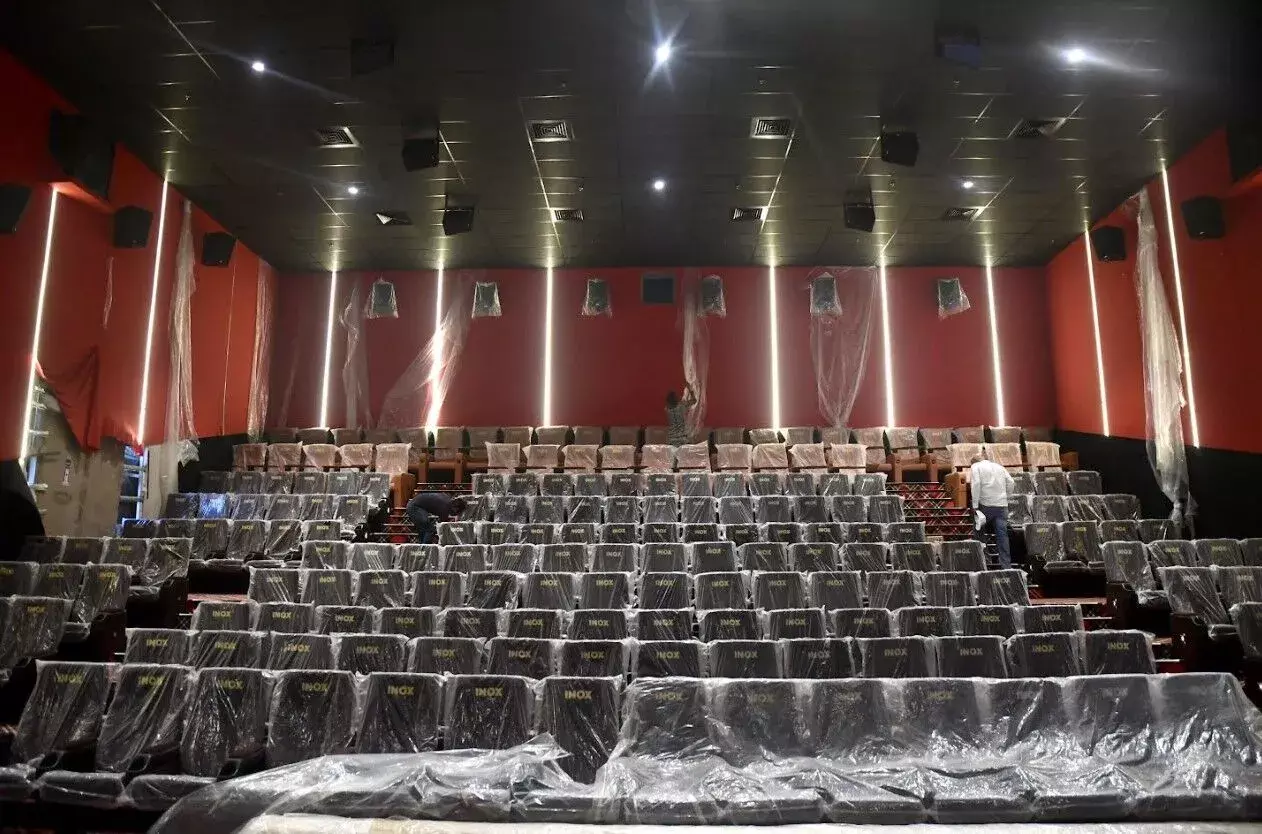Cinema Returns to the Valley
Three decades later, Srinagar is once again ready for a day at the movies

After more than three decades, a cinema hall in Kashmir will allow locals to see movies on a large screen for the first time in Srinagar's Shivpora area. Kashmiri businessman Vijay Dhar, and film distributors and theatre chain INOX, have collaborated to open the Valley's first multiplex in September. This multiplex has three movie theatres with a total seating capacity of 520 people. It has the latest Dolby sound systems installed to improve audio quality, and is superbly built.
Ansar Hussain, 25, a filmmaking student, told The Citizen that the opening cinema halls may provide a platform for local film culture and production in the region to thrive. Anil Kumar, 30, the Site Incharge of INOX Multiplex, told The Citizen that the venue also has numerous food outlets and entertainment options for children. "We have attractive game rooms here. Apart from watching movies, kids will have a great time," said Kumar.
He claimed that the multiplex's design will incorporate Kashmiri culture such as a papier-mâché and khatamband (wood panelled) ceiling. According to Kumar, local cuisine will also be featured in food courts.
The goal of reintroducing cinema in Kashmir, according to Vijay Dhar, owner of the INOX multiplex in Srinagar, is to give younger generations access to entertainment available across the nation. "This is open to all. Our children should be happy. Now they can enjoy 3D movies. They must shout and scream. There is nowhere to go these days for entertainment besides sports and food," said Dhar.
In the 1980s, nine of the Valley's 15 operating movie theatres were located in Srinagar. Broadway, Regal, Neelam, Palladium, Firdaus, Shiraz, Khayam, Naaz, and Shah were the most well-known movie theatres in Srinagar. While some of them were transformed into hotels and even hospitals, the majority became camps for security forces deployed in the Valley. Since the start of the insurgency, security forces have occupied these movie theatres, which are now rundown and devoid of all amenities.
However when the cinemas functioned, Saturday, which was a half-day, was special. Ahmad Mir, 47 a shopkeeper in Srinagar, told The Citizen that they would wait all week to watch a movie in the local cinema in Srinagar. "I still remember the time when my friends and I begged the school watchman to let us out early so we could watch the afternoon show at the nearby Neelam cinema," Mir told the Citizen.
However, following the deadly militant attacks on theatres, fear overcame all and ultimately Kashmir's cinematic tradition came to an end. "It's okay for new theatres to open in Kashmir, but the movies they show should be worthwhile," added Mir.
The J&K government of Farooq Abdullah, who was the chief minister at the time, attempted to revive movie theatres in 1999. The government allowed Regal, Neelam, and Broadway to start showing movies. However, a terrorist attack took place during the first show at the Regal theatre. One person was killed, and fear returned.
The family of Vijay Dhar, a resident of Srinagar, who currently runs the city's Delhi Public School earlier owned the Broadway Cinema. Like with other movie theatres in the city, the family had to close as a result of militant threats. Incidentally, Dhar is the son of diplomat and politician D.P. Dhar's who was a major architect of India's involvement in the liberation of Bangladesh.
"As a student of film studies, I see there is the potential to make the best films in each corner of Kashmir," said Ansar Hussain, a student at Central University of Kashmir who hopes to become a filmmaker. He told The Citizen that he anticipated that the opening of new cinema venues in Kashmir will help talented local youth studying filmmaking in different universities. Hussain added that this will also open up opportunities for others to find employment locally.
"There is no shortage of talent in Kashmir. All we need is guidance and a suitable platform. It's the time now Kashmir will enter into the Oscars if the opening of the new cinema halls provide employment to locals," he added.
Despite a decline in the national level unemployment rate, Jammu and Kashmir recorded a 25 percent unemployment rate in March 2022. This is higher than India's overall unemployment rate of 7.6%, according to the Centre for Monitoring Indian Economy (CMIE).
Engineer Aijaz, a DDC Member for the Bharatiya Janata Party (BJP) in Srinagar and a member of the Indian Haj Committee, told The Citizen that reviving Kashmir's cinema culture will undoubtedly strengthen the union territory's economy. He said that these theatres will give the local youth what they have desired for decades. "There is no need for local Kashmiri youths to go to outside states in search of jobs. Setting up the cinemas in Kashmir, may help many youth settle down. Re-establishing the cinema culture in Kashmir is an indication of the peace process," he said.
According to Dhar, the opening of the multiplex after 32 years is also a tribute to legendary Bollywood actors like Raj Kapoor, who travelled to Kashmir for the shooting of Barsaat. Since then, several films have been shot in Kashmir. He estimated that Kashmir was the location for more than 30% of the classic movies.
"Why can't we have theatres in Kashmir if people in Jammu can?" asked Dhar, adding that the people of Kashmir love movies and will support the growth of cinemas. "People in the valley have helped me build the best schools in Srinagar. I am confident that they will also assist me in this endeavour," he added.
Before the outbreak of insurgency in the valley, many popular films were shot in Gulmarg, Pahalgam, and Srinagar. However, later a number of cinemas were targeted by the militants and remain closed to this day.
Photographs BASIT ZARGAR.



